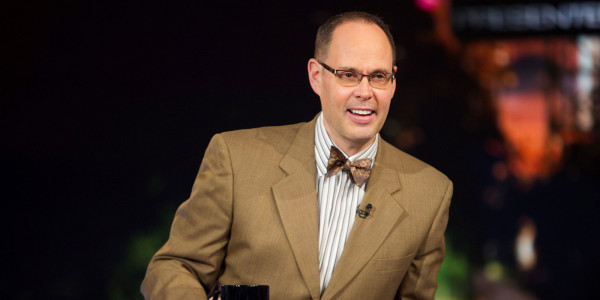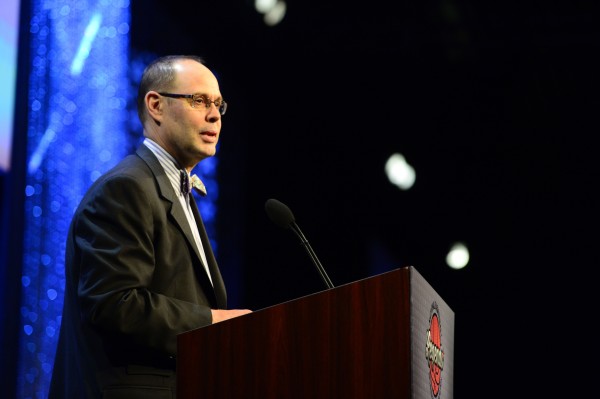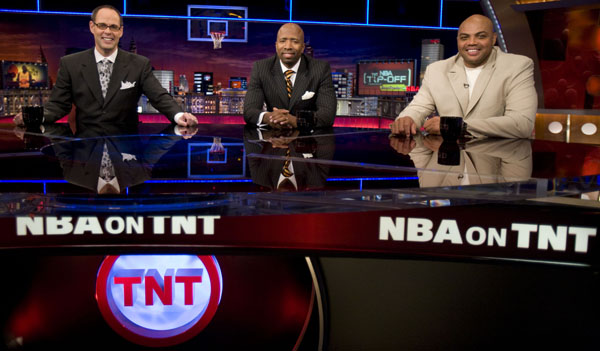The RTC Interview Series: One on One With Ernie Johnson
Posted by Chris Stone on March 30th, 2016
Turner Sports‘ Ernie Johnson is perhaps best known for his role mediating the rambunctious crew on TNT’s Inside the NBA, but this weekend he will host TBS’s coverage of the NCAA Tournament’s Final Four and National Championship. With the event just days away, we had an opportunity to sit down with Johnson to discuss the NCAA Tournament’s first championship on cable, the differences between preparing for the NBA and March Madness, and what advice he has for sports media hopefuls.
Rush the Court: As a longtime employee and icon for Turner, can you give us your thoughts on what it means to have this level of coverage for such a huge event in the college basketball world?
Ernie Johnson: Well, first of all, let’s go with longtime employee and you can hold off on the icon. It means a lot to all of us. It really does. I’ve been there since 1989. I’ve seen this company grow in ways we never thought and then have properties that I didn’t know we’d be covering. We were all excited when we signed the deal with CBS to team up on this for a long time and we knew somewhere down the road this would happen, but now that it’s here, it is very special. It’s certainly a point of pride for all of us that when you want to watch the games Saturday and on Monday night, you’ll be watching it on TBS. Turner’s got the championship game in the NCAA Tournament. We are pumped about that.

Ernie Johnson will host studio coverage of the NCAA Tournament’s Final Four this weekend. (Credit: CSE)
Rush the Court: You also have the Team Streams as well, right?
Johnson: Yeah. They’re going to have the homer broadcasts, for lack of a better word. My hope is that everybody gets that stream, but I know that not everybody will because somebody will think, “OK, let’s watch the game on TNT,” and expect to hear Jim Nantz and Grant Hill and Bill Raftery and Tracy Wolfson on there and they’re going to get somebody that yells and they’re going to be cheering like mad for Villanova and they’re from Oklahoma and they’re ticked. It happened last year, too. We had people on social media going nuts saying, “What are these guys doing? Why don’t they just wave their pom-poms?” Hey, you’re watching the wrong channel. So really, right down the middle, the standard broadcast, TBS. If you’re anywhere but TBS and you’re watching the game, you’re going to hear some cheerleading.
Rush the Court: As we head into the Final Four, we’ve had a couple of weeks to get used to March Madness, so we were curious what storylines you are most interested in now that we’re down to just four teams.
Johnson: The whole tournament is like a canvas. It’s blank on that first Thursday and you want to see what kind of colors are going to get splashed up there. Basically, you can talk about what team colors are going to be there. For a while, it looked like we were going to have chalk. That’s the way it appeared because they all sailed into the Elite Eight and then the bottom fell out on a few. I think the big question is, “Is anybody as good as North Carolina?” Is there any stopping North Carolina because I think they’re the most complete team out there. I think they’re the deepest team out there. They do everything very well except shoot the three-ball, and on occasion they do that well. When that happens, I think they’re unbeatable. I think that’s the question. You go back to Selection Sunday and the uproar from a lot of folks about the fact that Syracuse got in the Tournament. Here they go from first four out into the Final Four. I think it’s always kind of cool when the best player in the nation leads his team to the Final Four like Buddy Hield has. That’s awesome. There was some disappointment early on. People looked at if Ben Simmons was going to be in the tournament. We hear all about Ben Simmons. Couldn’t get LSU into the tournament. Buddy Hield has carried Oklahoma, obviously with help from [Isaiah] Cousins and [Jordan] Woodard, but he’s the signature guy. With Villanova, it’s finally getting through that glass ceiling of the first weekend and showing people what they’re capable of. There’s any number of storylines out there and I’m sure that there will be more that develop as we got through the weekend.

Ernie Johnson is a Stand-up Guy Who Happens to Also Win a Bunch of Broadcasting Awards. Young People, Learn How to Communicate! (USA Today Images)
Rush the Court: Can you discuss the difference between covering the NBA on Inside the NBA and the storylines for something as crazy as the NCAA Tournament?
Johnson: Just in terms of the differences I see when I’m sitting in that chair during the Madness and sitting in that NBA chair. If you look at the players involved, obviously the better players are in the NBA. They’re all NBA players. There’s just a small percentage of the college rosters will be NBA players. But for genuine emotion, for the realization a lot of times postgame that a coach can’t even form words because he can’t get out how much he’s going to miss coaching certain players and certain groups of players, you can’t get that in the NBA. You cannot get that level of gut-wrenching emotion and the realization of the end of a career. You can’t get that in the NBA and that’s where the Tournament has it over the league. And also, just that one and done kind of a thing is very appealing. When I get down to the NBA Finals, I want to see the two best teams and I want to see them playing a best of seven. I think that removes any doubt of which is the better team, so I’m fine with that, but there is a certain charm to this whole you’ve got to bring it every night thing. You are not allowed to slip up because that’s the way the Tournament works and I think that’s what draws you to it. The emotion and the finality of it. That’s what I love about the Tournament.
Rush the Court: What’s different for you in preparing for the NCAA Tournament?
Johnson: I’ve been at Turner since 1989 and working the NBA since the 1990-91 season, so I’ve had all of that lead up time to get comfortable with my preparation for shows or for seasons. You’re focusing on 30 teams. I keep files on all these teams, so I just update those and one year rolls into the next year. There’s a certain ritual I have on game days of preparing for the show. With the college kids, now this is our sixth year. When I started out six years ago, I started creating files on teams that I thought would be in it and then others that had a chance to be in it. So, I’ve got files on probably 150 teams right now and some I haven’t touched in years, but others, you know when to ramp up. By this point, I say what’s the calendar say? Alright, it’s early January, now I’m going to start doing this part of my prep and now I’m going to get to this section. Now, I’m really going to start watching games a lot more rather than just watching highlights. So, there are just certain stages that you go into it. Then it’s full bore in the last three weeks before Selection Sunday where you’re finalizing or updating all of these teams that you think are going to be in it and familiarizing yourself as much as you can. It’s not like you have to commit everything to memory, but you have to remember where you wrote it down so when you have notes in front of you, you have to say, “Look, I remember looking at that stat, I remember looking at that number about this team when they lead at the half or I remember about their three-point defense.” There are just so many numbers and so many stories. You look for nuggets on guys that you can throw to the fans because what you have to realize when you do this is so many non-sports fans are watching it. This is a tournament that brings everybody together. It brings the people from accounting and the people from marketing around the water cooler. They may never have met, but they’re talking about Thomas Walkup’s beard. Now, you’re having to introduce a lot of folks to here’s what you need to know about this team, here’s why you might find them a team you want to root for, here’s a compelling story on a college kid. That’s why those March Madness Confidential’s that CBS produces that we run throughout the tournament are so good because it gives you a little insight into teams and it makes players and coaches and schools more rootable.

Ernie Johnson is the host of TNT’s Inside the NBA.
Rush the Court: Has the on-air chemistry between the CBS and Turner talent improved over the years to the point where you have a good symbiotic relationship now?
Johnson: Oh yeah. Everything takes time. You never know how things are going to work out the first time you put people together. I think it’s been great. Greg Gumbel is so easy to work with and he and I split the studio up there that first week. He’s worked with Clark [Kellogg] more and I’ve worked with Kenny [Smith] and Charles [Barkley] more, but we all know each other and we all get along. It’s all great. Early on in the relationship, there was a real, concerted effort to say, “Let’s blend CBS and Turner.” Now, we’ve gotten past that stage. Still, you’re going to see two sets at the Final Four because we’ve got three hours of pregame on Saturday. That’s a lot of TV, even for you guys to watch. The partnership is tremendous. When you’re sitting in our seminar, which happens a week before Selection Sunday, and you look round the room and there’s Verne Lundquist, and there’s Raf, and there’s Jim Nantz, and there’s Chuck and Kenny and the list goes on, Kevin Harlan, Brian Anderson, and Chris Webber and Reggie Miller. It’s pretty awesome. It really is. We all love the dance. When you get down to this point, all that research and all that stuff you were working on, it’s all worth while because you get to this point and you feel like you know the teams pretty well.
Rush the Court: Speaking of the studio guys, was there an Ernie Johnson puppet?
Johnson: I think there was, but I was already back in Atlanta. I have not seen that segment, but I’m told I need to. I don’t know if that’s in a good way or a bad way, but I will check it out. I understood that it was going to happen. One of the producers up there had said, “We have this great idea, but we haven’t gotten them all in yet.” I think we were going to do it when I was up there in New York for the first weekend, but I missed out and I don’t know where mine is. It could be floating around in a UPS box somewhere. Who knows?
Rush the Court: It could come this weekend perhaps.
Johnson: I’ll just use mine! It’ll be really entertaining.
Rush the Court: What recommendations would you have for young people who are trying to get into broadcasting or writing?
Johnson: When I was coming up and I’m graduating from the University of Georgia in 1978, long before you guys were born. Here was the deal: Go to a small local station, get your feet wet, make mistakes, learn how to do everything and try to climb the ladder. The only places you wanted to go eventually were CBS, NBC or ABC. That’s all we had. When I started, that’s what it was and then all of the sudden, ESPN comes along and changed everything in terms of cable. Then you get the TBSs and the TNTs, etc., playing major roles in covering sports. It’s different now. We didn’t have the Internet, believe it or not. We had no computers that we were working with. Everything was with the Olivetti Typewriter. There were no podcasts. There was no YouTube. Now, somebody strikes it rich because they put some video on YouTube that three million people watch and all of the sudden, “Hey! Why do I need to go down to Spartanburg, South Carolina, or Macon, Georgia, to get my feet wet? People know who I am!” It’s changed in that way. Here’s what I tell college students all of the time. Learn how to write. Learn how to communicate. Learn how to express yourself without reading a teleprompter. Number one: love the sport. You’ve got to be driven. You have to have a genuine love of sports to do this. I think that’s kind of the deal, but please don’t neglect the building blocks that all of us who came up the old way did. That’s how to express yourself, how to write, how to report and how to be right. Those are important things. You see too much on social media with someone just throwing something against the wall to see if it sticks. Then they don’t care if it’s right or not, but they got there name out there. That’s not the right way to go.
Rush the Court: Do you think it’s better for, whether they’re going into writing or broadcasting, to focus on that one area and really become an expert in that one area or try to get a little taste of everything?
Johnson: I think it helps to be a diverse kind of person. A Major League manager when it comes time to trim the roster after spring training, looks at a guy and says, “This guy can play some left field and he can play some third and if I need him, he could probably catch an inning or two and he’s a pretty good pinch hitter and he rakes against lefties, so I think I’m going to keep this guy.” I think that goes the same in this profession. I started out as a newsman. I was on the radio. In Athens when I was in school, I was doing news and sports both. I wanted to get into TV. The first time I interviewed for a sports job, it did not go well. Let’s just put it that way; down in Albany, Georgia. Never got a call back. So then, here comes Macon, Georgia saying, “We need a news anchor,” and they’re the 135th market in the country. They hired me to anchor the news. I looked like I was six years old, but I got the job. I was able in that year-and-a-half there to learn so much about the business. There were stories that maybe had a sports angle and I’d get my foot in there. I go to Spartanburg, South Carolina for a year, go to Atlanta at WSB. I’m still in news at that point. It’s luck and it’s timing. It’s divine intervention, call it whatever you will. I’m filling in for a sports guy when the new news director takes over that day. The first show he watches, I’m doing the sports, filling in. Next day, he calls me into his office saying, “Have you thought about doing sports?” And I’m like, “Beats the heck out of going to the city counsel meetings. I’d love to do that.” Your career changes totally right there. I think it’s very important to not only learn different sports and not be so tied to the dream that I want to be the next Vin Scully. I want to do Dodgers’ games and I’m not going to take anything but play-by-play gigs that are baseball. No. If somebody’s going to give you a chance, you walk through that door and you learn all you can. That goes for learning about writing, editing, shooting, you name it. Being able to do a lot of different things makes you very valuable in this business. That’s for sure.









































